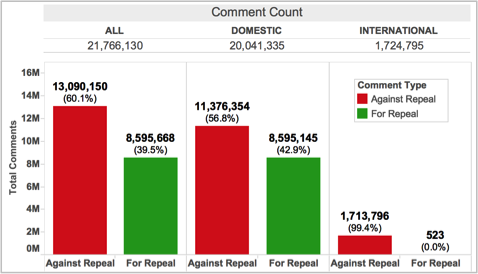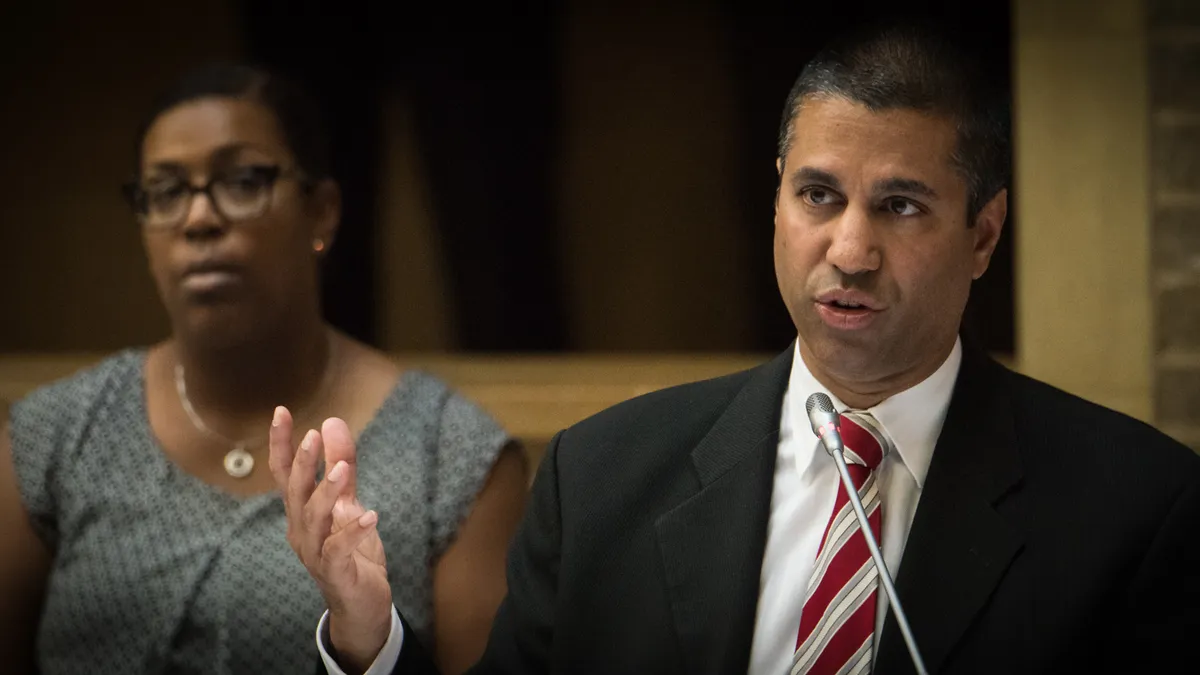Dive Brief:
-
The Federal Communications Commission's "Restoring Internet Freedom" docket closed for public comment Wednesday with around 22 million comments. Approximately 60% were against the repeal of Title II and 39% for the repeal, according to a report by data analytics company Emprata, LLC. The FCC said it will consider the merit of the comments as it prepares to move forward with the proposal.
-
After removing pre-generated form letters that repeated throughout the docket, Emprata found 1.7 million unique comments against and 24,000 unique comments for the repeal. Approximately 7.75 million comments were generated by "temporary" and "disposable" email domains, and 9.93 million comments were multiples submitted by the same entity.
- The FCC postponed a Sept. 7 hearing to discuss net neutrality after none of the eight major tech companies responded to the invitation to weigh in on guidelines for an open internet, according to the Morning Consult. Facebook and AT&T were among several of the invited companies who confirmed currently engaging in private negotiations with the commission on the matter.
Dive Insight:
In March, FCC Chairman Ajit Pai reiterated intentions to repeal Title II Net Neutrality Rules, which prevent internet access providers from slowing down access to web content. A few months later, the FCC opened the period for public comment after a decision to move forward with Pai's proposal to reclassify broadband service as Title I.
At a press conference Pai noted the raw number of comments submitted is not as important as the substance contained within arguments for or against the repeal, according to Ars Technica.
Emprata's analysis of the comments is notable in that it highlights the difficulty ahead for the FCC in ascertaining how reflective the comments are of public sentiment. The FCC will decide how valuable and "genuine" comments are, considering factors of duplicates, unique versus form comments, temporary versus valid addresses and geographic origin, among others.

Definitive, widely-agreed upon conclusions from the data will therefore be hard to find. The subjectivity of the comments themselves coupled with potential professional or political biases offers significant room for interpretation. Many believe the FCC's has already decided the future of net neutrality.
After reviewing comments, the FCC will publish a report and order in the Federal Register informing the public on its choice to adopt new net neutrality rules, modify existing ones or forgo any changes, according to the commission's rulemaking processes. It remains unclear how long this process will take.
In the meantime, opponents and proponents of Title II — a distinction generally mirroring internet service providers versus content providers, respectively — have been making their cases on the contentious issue.
Comcast maintained its commitment to an open internet and emphasized the need for bipartisan legislation enacting "sensible and enforceable" internet protections over the regulatory "ping pong" that has emerged from the FCC in recent years, according to a recent company blog post. The company’s comments reflect sentiments put forth by other internet service providers.
Proponents of net neutrality rules have cited concerns over the power of media giants to act as 'gatekeepers' of the web, according to S&P Global. This July, Amazon, Google, Facebook and Twitter were among tech companies that banded together for an online "day of action" to protest the potential repeal of Title II.













